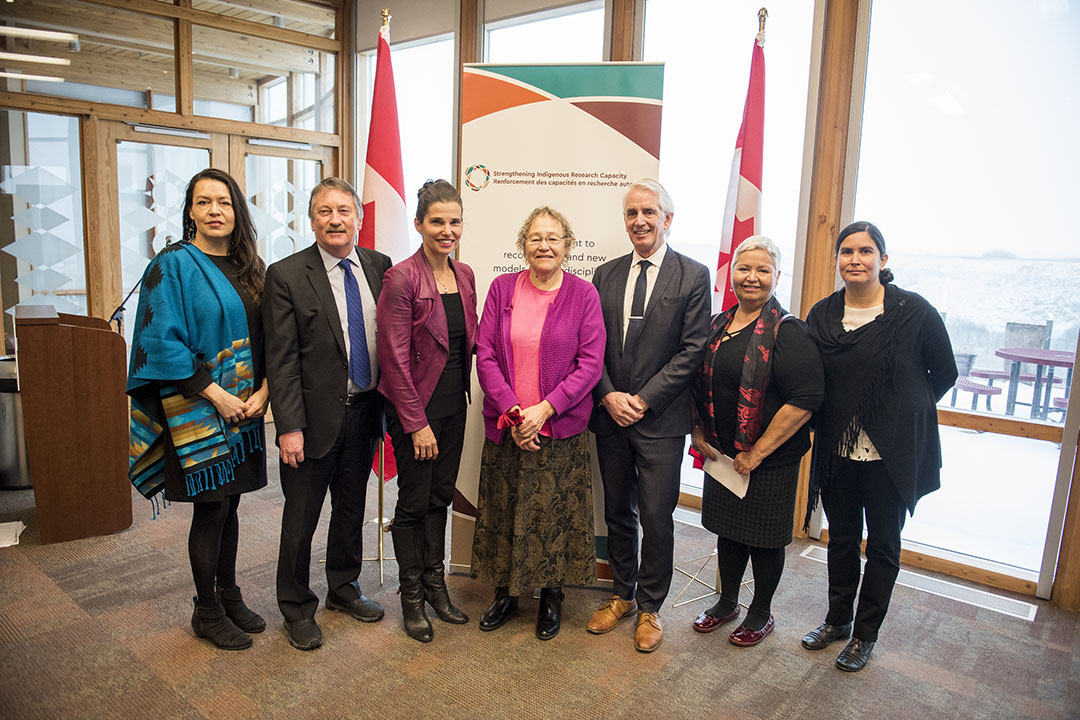
Research grants to USask advance Indigenous agriculture, safe water, reconciliation
Four University of Saskatchewan (USask) researchers have been awarded more than $160,000 in Connection Grants by the Social Sciences and Humanities Research Council for projects aimed at revitalizing agriculture on Indigenous lands, fostering reconciliation, ensuring safe water supplies, and designing sustainable communities.
The USask award recipients are:
Melissa Arcand
Melissa Arcand, assistant professor and soil scientist in the College of Agriculture and Bioresources, was awarded $34,000 to host a forum on Indigenous agriculture in Saskatchewan. She is collaborating with USask colleagues and six Indigenous organizations and community representatives.
The recent two-day event brought together more than 80 Indigenous leaders, land managers, farmers, non-profit organizations and researchers, as well as non-Indigenous USask researchers and federal and provincial officials to share information on agricultural activity on an estimated 1.5 million acres to four million acres of reserve lands in Treaty 4 and 6 territory.
“There’s virtually no published data about agriculture on First Nation lands in Canada, including how many Indigenous farmers there are or how much reserve land is used for agricultural production,” said Arcand.
“The challenge is to fill this knowledge gap by connecting First Nations involved in agriculture with each other and with researchers and policy makers to help communities benefit more fully from agricultural activities, both by supporting Indigenous farmers and negotiating fair leases with non-Indigenous farmers who currently cultivate more than 80 per cent of reserve land in Saskatchewan.”
The goal is to establish a vision for Indigenous agriculture, with communities setting priorities to guide multidisciplinary research, partnering in knowledge development, and deciding how the information is used to make decisions, Arcand said.
Keith Carlson
Keith Carlson, history professor in the College of Arts and Science, and his Stó:lō Indigenous partners of the lower Fraser River watershed in British Columbia, were awarded $49,000 to develop resources that will help foster reconciliation between Indigenous and settler Canadian societies.
The project brings together a wide cross-section of contemporary and ancestral Stó:lō voices to articulate what reconciliation might, could, and should (or should not) look like to genuinely empower Indigenous communities and decolonize Canada. The goal is to reflect gender, age, social status, educational and political diversity in envisioning reconciliation and building policy toward that goal.
Robert Patrick
Robert Patrick, associate professor in the Department of Geography and Planning, College of Arts and Science, was awarded $28,000 to facilitate a collaborative community-based source water protection plan involving Onion Lake Cree Nation (OLCN) and the North Saskatchewan River Basin Council.
The objective is to build relationships of trust and reciprocity between OLCN, university, NGOs, industry and government on a pathway to reconciliation. The project draws on local expertise, traditional knowledge and western science to help protect and celebrate the source of drinking water for the community—the North Saskatchewan River.
Potential threats to the water supply will be identified, along with specific management actions to mitigate risk. A draft of the water protection plan will be presented to OLCN’s leaders this spring, with the final plan released to the community in April.
Alexandria Wilson
Alexandria Wilson, professor in the College of Education and director of the Aboriginal Education Research Centre, was awarded $50,000 for a community-led collaborative research project that helps address key concerns of adequate housing and water and wastewater issues in many Indigenous communities.
Wachusko weesti (muskrat hut) is a collaborative research and action project that brought together members from four First Nations—Wasagamak, Garden Hill and Opaskwayak in Manitoba, and Poundmaker in Saskatchewan—along with Indigenous and non-Indigenous researchers, professionals and students to design and build a mobile, off-grid washroom and kitchen unit powered by solar and wind energy.
The goal is to incorporate the design into building environmentally sustainable villages to meet the housing needs of communities that now rely on risk-prone, expensive and hard-to-maintain cistern systems for handling water and sewage.
Connection Grants for Indigenous Research Capacity and Reconciliation support interdisciplinary events, outreach activities and development of position papers to help guide a national strategic plan that will identify new ways for First Nations, Métis and Inuit communities to conduct research and partner with the broader research community.
A national dialogue event is scheduled to be held in Ottawa in March of 2019 at which grant recipients, in partnership with Indigenous communities, will share their position papers and help develop a strategic plan for interdisciplinary Indigenous research and research training that will contribute to reconciliation with First Nations, Métis and Inuit communities.

